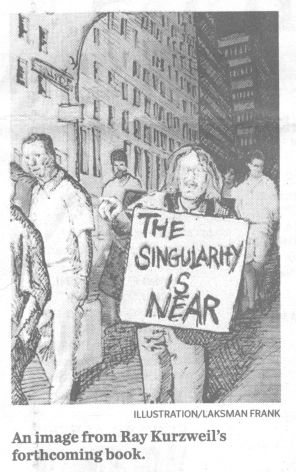That Singularity sensation
Inventor/entrepreneur Ray Kurzweil has become the high-tech version of the cartoon character carrying the sign: "The End Is Near." With dogged consistency, the founder of eight different technology companies has been proselytizing an end-of-humantime event called the Singularity, a Buck Rogers vision of the hypothetical Christian Rapture.
Like everything, the term was first coined by mathematician John von Neumann, who spoke a half-century ago of "the ever accelerating progress of technology . . . approaching some essential singularity in the history of the race." More recently, San Diego State computer scientist Vernor Vinge has predicted that man-made "entities with greater than human intelligence" would dominate the planet.
In his forthcoming book, "The Singularity Is Near," Kurzweil calls the Singularity "the inevitable next step in the evolutionary process." Already, human activity is enhanced by technological substitutes, e.g., robotic prostheses, artificial skin, blood plasma, etc. The Singularity, which Kurzweil says will occur at mid-century, is the moment when biological material ceases to exist, and we become products of the revolution in "GNR": genetics, nanotechnology, and robotics.
It's as if the flesh and blood Neo of "The Matrix" progressively morphed into the digital Agent Smith. See, that was easy.
 Naturally, Singularitarians have been greeted with hooting
skepticism. Kurzweil allows that few people are yet
"Singularity-aware," and he expresses surprise that even Nobel Prize
winners have attacked him. (That's why they have Nobel Prizes, no?) To
be fair, Kurzweil welcomes questions about his idiosyncratic views. In
conjunction with the Singularity, he has long been plugging the idea of
radical life extension, for which he has been "aggressively
reprogramming" his biochemistry," pumping about 250 pills a day into
his 57-year-old "version 1.0 body."
Naturally, Singularitarians have been greeted with hooting
skepticism. Kurzweil allows that few people are yet
"Singularity-aware," and he expresses surprise that even Nobel Prize
winners have attacked him. (That's why they have Nobel Prizes, no?) To
be fair, Kurzweil welcomes questions about his idiosyncratic views. In
conjunction with the Singularity, he has long been plugging the idea of
radical life extension, for which he has been "aggressively
reprogramming" his biochemistry," pumping about 250 pills a day into
his 57-year-old "version 1.0 body."
But I am more interested in the religious implications of the Singularity. How is this techno-Apocalypse so different from Judeo-Christian end-of-time scenarios, or from the Rapture, the now-popularized notion that Jesus Christ will soon swoop down from the heavens and embrace (Christian) mankind with salvation?
Raised as a Unitarian, Kurzweil realizes that outsiders seize on the spiritual dimension of the Singularity. In his book, he reprints a private exchange with Bill Gates on this subject:
"Bill: . . . So is there a God in this religion?
Ray: Not yet, but there will be. . . . Ultimately the Universe will become saturated with intelligence. It will 'wake up,' be conscious and sublimely intelligent. That's about as close to God as I can imagine."
Kurzweil waxes astringent on religion, which he says exists primarily "to rationalize death, since up until just now there was little else constructive we could do about it." "But I'm not promoting a religion based on faith," he explains, "except the belief that the Universe actually exists and that there is something going on other than thoughts in my own mind. My thinking has not gotten a lot of resistance from Christian thinkers, because they see the Singularity as a scientific reflection of what they've always believed.
"I always knew something profound was going to happen around the middle of the 21st century, it's just that I got there through science."
Found object
Shall I compare thee to a Summers' day?
Thou art not modest nor yet temperate.
Rough winds do shake the Mass-y Halls of clay,
And Summers' lease hath all too short a date
Sometime too hot the seat of power glows,
And fair and dark and wise sometime combine,
To bring the course of Summers to its close
And thy 'eternal' Tenure shall soon fade
And lose possession of that Hall thou hir'd;
The learned have given thee thy grade.
So go thy way or know thou willst be fired
Now that ladies count and Hebrews farm,
Now farewell to all of Summers' gold'n charm.
Anonymous
Alex Beam is a Globe columnist. His e-dress is beam@globe.com.